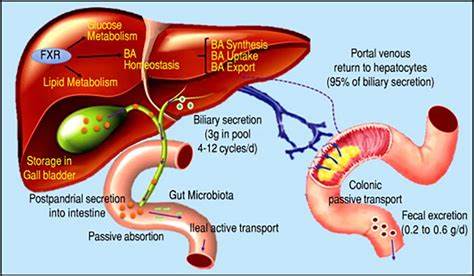Clinical significance
In the absence of bile, fats become
indigestible and are instead excreted in feces,
a condition called steatorrhea.
Feces lack their characteristic brown
color and instead are white or gray, and
greasy. Steatorrhea can
lead to deficiencies in essential
fatty acids and fat-soluble
vitamins. In addition, past the small
intestine (which
is normally responsible for absorbing
fat from food) the gastrointestinal
tract and gut
flora are
not adapted to processing fats, leading
to problems in the large intestine
|







